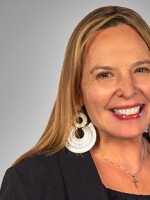BETHLEHEM, Pa. — Dr. Holona Ochs held back tears as she described how her Native American mother was forced to undergo a medical procedure as a teen.
Her mother gave birth to Ochs at 15 and had another child a year later.
"After that, she was forcibly sterilized in 1977 in Columbia, Missouri," Ochs said. "She was given a hysterectomy and [the doctors] told her as a Native woman with two kids at 16 years old, she should not have any more kids."
Ochs, an associate professor of political science at Lehigh University, is of Apache and Cherokee heritage.
She was among three faculty members who led the "Voices of Resilience: Personal Narratives of Native American Faculty and Staff," an emotional panel discussion held inside the Health, Science and Technology building on Friday, Dec. 1.
"The bodily autonomy that [my mother] lost — who I am to talk about being indigenous? Who am I? I am nobody compared to what she has been through," Ochs told the crowd. "Someone has to tell her story."
Joining Ochs were Dr. Junior Reina Toc and Dr. Joseph Pacheco.
During the hour-long discussion, the trio shared how racism against Native Americans and indigenous people has permeated their lives
The free event was organized by Lehigh's Office of Multicultural Affairs, or OMA, to commemorate National Native American Heritage Month, which takes place in November.
Racial slurs, microaggressions
Pacheco, an assistant professor with an indigenous population focus in the College of Health at Lehigh University, is of Cherokee and Quechua descent.
He grew up in Kansas City, Missouri, where he revealed people would often say that he could "pass."
"Passing" is a term for a member of a racial group who is accepted or perceived as a member of another racial group.
"Talking about microaggressions, the most insulting thing you can tell someone is that you can pass for X, Y and Z," he said.
Pacheco became visibly upset as he held up his cell phone and shared a photo of his two sons.
He continued to explain that he fears that, they too, will be racially profiled in life.
"I'm getting emotional because I'm talking about my boys. One is darker than me and one is way lighter than me," Pacheco noted. "The first thing that my wife's family said was, "he got one and we got one.'"
"My older son is going to have a harder time with racism because of his skin color and my white-colored son is going to have a hard time fitting in because he has a Hispanic [sounding] last name, but his skin tone doesn't match that."
Ochs, who never met her Caucasian biological father, said because of her skin tone, she is often mistaken as a white woman.
"I don’t look like the Hollywood version of a Native American and I recognize that...I can access by identity. I can be white, but I insist that people recognize my indigenous roots for all the people in my family who didn’t access this level of privilege."Dr. Holona Ochs
"I don’t look like the Hollywood version of a Native American and I recognize that...I can access by identity. I can be white, but I insist that people recognize my indigenous roots for all the people in my family who didn’t access this level of privilege," she said.
Having conversations about race is vital, especially in predominantly white schools like Lehigh.
According to the university's website,59% of students enrolled are white, compared to 11% Hispanic students and 11 percent Asian students currently enrolled.
Zero percent of students identify as American Indian or Alaska Native.
"I’ve been here since 2009 and no one has ever asked about my experience in As a Native American woman in higher education," Ochs said.
"Plenty of people to my face and behind my back have called me Pocahontas. People that I work with have called me a squaw. Squaw, by the way, means rapeable woman."
Protecting the rights of indigenous peoples
Toc, hails from Guatemala and lived in Colorado most of his life.
He is the program manager at Lehigh's Iacocca Institute, which fosters diversity, and global leadership and encourages the embodiment of different cultures.
His family is from the Poqomchí tribe — one of 24 indigenous tribes in Guatemala.
Like Ochs and Pacheco, he often defends his roots and is judged by the way he appears.
"I’m fighting to maintain the indigenousness — not everyone defines at Latino or Latinx. Because I’m coming from Colorado, people think I’m more Chicano," Toc explained. "For some reason, indigenous people are always erased, immediately erased, because that was the goal....People say there’s post-colonial, there’s no post-colonial. It’s still continuing."
As part of his work, Toc hopes to raise awareness about the plights of indigenous people — not only in U.S. but across the world.
"It's about the commitment to being indigenous — participating in ceremonies, helping out others, being part of the community," Toc said. "You don’t need to speak the language to be part of that community."

